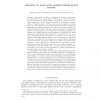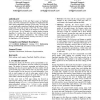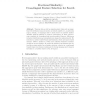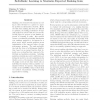378 search results - page 4 / 76 » Learning to Rank with Supplementary Data |
CORR
2008
Springer
13 years 5 months ago
2008
Springer
Abstract. We propose a number of techniques for learning a global ranking from data that may be incomplete and imbalanced -- characteristics that are almost universal to modern dat...
SDM
2007
SIAM
13 years 6 months ago
2007
SIAM
The problem of combining the ranked preferences of many experts is an old and surprisingly deep problem that has gained renewed importance in many machine learning, data mining, a...
WWW
2006
ACM
14 years 6 months ago
2006
ACM
Since the publication of Brin and Page's paper on PageRank, many in the Web community have depended on PageRank for the static (query-independent) ordering of Web pages. We s...
ECIR
2011
Springer
12 years 9 months ago
2011
Springer
Abstract. Training data as well as supplementary data such as usagebased click behavior may abound in one search market (i.e., a particular region, domain, or language) and be much...
ICML
2009
IEEE
14 years 6 months ago
2009
IEEE
Ranking a set of retrieved documents according to their relevance to a query is a popular problem in information retrieval. Methods that learn ranking functions are difficult to o...




